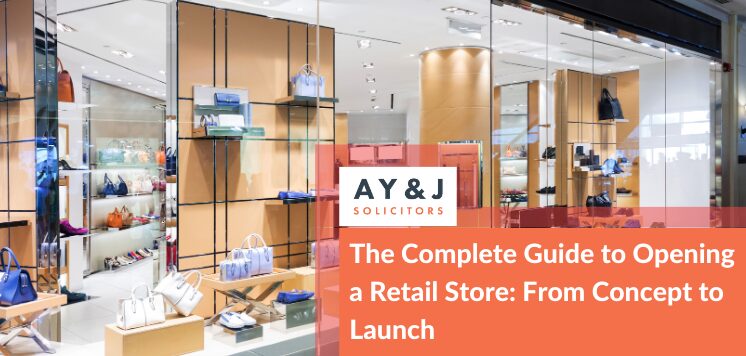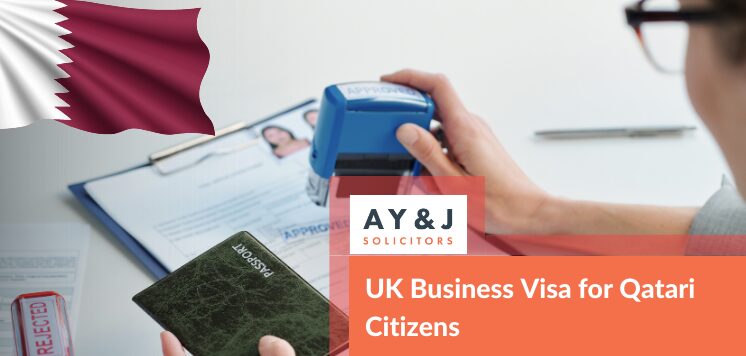Disclaimer: The information in this blog is accurate as of its publication date. Any updates after that date are not reflected here.
Are you an overseas business person considering opening a retail store in the UK? If so, you are not alone. Many international entrepreneurs have set their sights on the UK’s retail sector and have been extremely successful in the process. Starting a retail store can be an exciting and rewarding venture, particularly in the UK, where there is a thriving retail market. In this guide, we will explain how international entrepreneurs can open a retail store in the UK, from working on the initial concept to the grand opening. In particular, we will look at choosing the right type of visa, different retail store concepts in the UK, how to select the right location, franchising opportunities, and financial planning.
UK immigration routes for international retail entrepreneurs
To set up a new business in the UK as an overseas entrepreneur, you will first need a visa. Thankfully, the UK offers a number of different visa options for international retail entrepreneurs, including self-sponsorship, the Global Business Mobility (GBM), and the Innovator Founder visa. Each caters for slightly different needs, as we will discuss below:
Self-Sponsorship Route
The self-sponsorship route is an innovative immigration pathway that enables overseas business people to relocate to the UK to set up a business and sponsor themselves. Before applying for a business visa, you will need to prepare a comprehensive business plan outlining your business idea, market research, financial forecasting, and deciding on your business structure (e.g., sole trader, partnership, or limited company). If you intend to run a limited company in the UK, you will need to register the business with Companies House. To do so, you will need to choose a company name and provide a registered business address.
The next step is to apply for a sponsor licence from the UK’s Home Office. To successfully apply for a sponsor licence, you will need to demonstrate that your business has the necessary systems and processes to sponsor overseas nationals. Don’t worry; an immigration Solicitor in the UK can guide you through the whole process. You will also need to prove that your business is genuine and that you need to sponsor overseas workers.
Once your sponsor license is approved, you can apply for a Skilled Worker visa, allowing you to live and work in the UK to run your business.
Global Business Mobility Route
The Global Business Mobility (GBM) route enables already well-established overseas businesses to expand into the UK market. In particular, the UK Expansion Worker visa (one of four GBM visas) allows businesses to send a representative to the UK to establish a branch or subsidiary here.
To make a successful Expansion Worker visa application, you will need to prepare an expansion plan detailing how you intend to establish and grow your business in the UK. In addition, you will need to demonstrate that you have a physical presence in the UK, such as office space or a lease agreement.
Innovator Founder visa
The Innovator Founder visa is an excellent option for international retail entrepreneurs looking to establish a unique retail business in the UK. Your business idea must be innovative, viable, scalable, and crucially, it should bring something new to the UK market or offer a unique solution to a problem. To ensure that you meet these criteria, you will need to receive an endorsement from an approved endorsing body based in the UK with expertise in your area of business. You must also have enough money to set up your innovative retail store and personal savings to support yourself and your family while in the UK. In addition, you need to meet the English language requirement. This can be achieved by passing a Secure English Language Test (SELT) at CEFR Level B2 or by having an academic qualification that was taught in English.
Choosing the right type of retail store
The sky is the limit when it comes to choosing the right type of retail store to establish in the UK. It is important to consider your skills and areas of expertise, market demand, and how much money you have to invest in your venture. Some of the most popular UK retail store options to consider include:
- Pound shops – Pound shops offer a vast range of diverse products to consumers at low prices, appealing to budget-conscious shoppers. Successfully operating in this area requires strong inventory management and a robust supply chain to maintain profitability despite slim margins. Pound shops tend to benefit from high foot traffic and consistent demand for low-cost goods.
- Beauty shops – Beauty shops can be extremely lucrative if you can choose the right product range and location and remain up to date with the latest beauty trends. Such stores offer a wide range of products ranging from hair care to cosmetics. A highly successful example of this type of business already in the UK is ‘Super Drug’.
- Clothing boutiques – Clothing boutiques provide a personalised shopping experience to consumers, often focusing on niche markets. Niche markets can be anything from sustainable fashion and vegan wear to luxury clothing. The main advantage of this type of retail store is the ability to set higher prices, but it is essential to have an excellent fashion sense, an eye for new trends, and highly effective marketing to attract and retain customers. The key to this type of business is establishing a brand with a loyal following, typically through social media.
- Second-hand stores – There is a rapidly growing market in the UK for sustainable and budget-friendly shopping. The primary challenge is sourcing quality used goods on which you can easily make a profit. This can be achieved, for example, through ‘up-cycling’ whereby an item (e.g. an item of furniture) is made into something of perceived higher quality at a relatively low cost. Success in this particular area of retail relies heavily on location and the ability to create a trendy and inviting store atmosphere.
Key considerations when setting up a retail store in the UK
Setting up a successful retail store in the UK requires careful consideration of a range of factors, including location and logistics, layout, and financial planning.
Selecting the right location for your store will be central to your success. Look for areas which are up and coming, perhaps due to new developments or transport links. Do bear in mind, however, that high foot traffic areas such as busy high streets typically require higher rents, but, on the flip side, they offer greater visibility and customer flow. Before choosing your location, we recommend carrying out market research to identify areas with high demand for your store type. In addition, look at the demographics of the area, your competition, and accessibility.
Having a great location is not enough on its own; you also need an effective store layout. This will boost the customer experience and, in turn, your turnover. Remember, always ensure that your store is welcoming and that your products are easy to find.
Another consideration is logistics. You will need to create a business supply chain that enables you to easily order new products from suppliers with cost-effective and prompt delivery. After all, no one wants to shop in a half-empty retail store, no matter how good your products are.
Franchising opportunities
Franchising is an attractive option for overseas business people looking to leverage the success of established UK brands (e.g. Greggs bakery). Franchising offers a proven business model, brand recognition, and ongoing support from the company that owns the franchise (the franchisor). This, in turn, reduces the risks associated with starting a retail business from scratch.
Franchisees are normally required to meet certain requirements, including investment, business experience, and a willingness to stick to the franchisor’s, often very rigid, operating procedures.
It is important to understand the financial arrangement for your chosen franchise. These are often different to normal businesses. Initial costs for a franchise include the franchise fee, setup costs, and ongoing royalties. Ensure you have a clear understanding of these costs and plan your finances accordingly.
How to open a retail store in the UK
Setting up a successful retail store in the UK is a journey that will require patience, diligence, and sound decision-making. Here are the main steps in opening a retail store in the UK:
- Before you do anything, visit the UK to research your retail business ideas.
- Develop a solid business plan which encompasses your concept, market analysis, and financial projections.
- Choose your premises/location
- Choose your business structure. If you opt for a limited company, you will register it with Companies House
- Setup a bank account in the UK
- Apply for a sponsor licence if you have chosen the self-sponsorship route
- Design your store layout, brand, and style
- Establish contracts with reliable suppliers who you can partner with
- Apply for a visa
- Hire and train staff to ensure excellent customer service
- Develop a marketing plan to promote your new retail store
- Plan a grand opening event with special offers, entertainment, and free samples to draw in crowds.
- Market your new business to ensure ongoing custom. Use platforms such as Instagram and Facebook to promote your store and engage with potential customers. Also, consider investing in local advertising, such as newspapers and radio, to reach your community. Offer special promotions or discounts to attract initial customers.
Final words
Opening a retail store in the UK can lead to considerable commercial success if done well. Whether you would like to open a clothes shop or a beauty shop or explore franchising opportunities, we wish you all of the best with your new venture in the UK. Remember, before you go too far into the process, it is important to check the visa options available to you and your family. Doing this early will ensure you are on the right track from the start and that you can remain permanently in the UK and gain British citizenship if these are your goals.
A Y & J Solicitors is a specialist immigration law firm with extensive experience with all types of visa applications. We have an in-depth understanding of immigration law and are professional and results-focused. For assistance with your visa application or any other UK immigration law concerns, please contact us on +44 20 7404 7933 or using our contact us page. We’re here to help!









